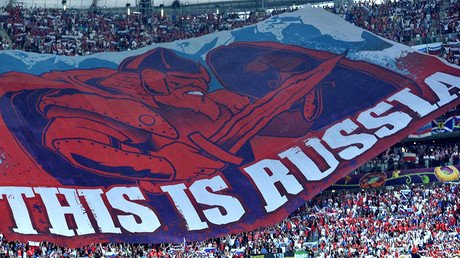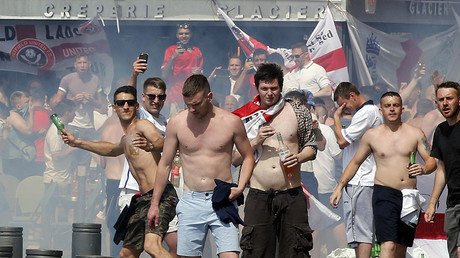‘BBC film on Russian football hooligans aims to sow fear’ of 2018 World Cup – Russian Embassy to UK
‘Russia’s Hooligan Army’, a new BBC documentary on violent Russian football fans, is shocking and aims to discredit Russia and its upcoming World Cup, Russia’s embassy in London said, adding that the film apparently aims to “sow fear” in British society.
“The film titled Russia’s Hooligan Army shot and broadcast by BBC Two with the Russia-hosted 2018 FIFA World Cup in mind is quite shocking. One gets the impression that its goal is to sow fear in British society and warn the fans against travelling to Russia,” the embassy said in a statement.
The documentary is based on “edited footage” of clashes involving “violent Russian fans” in Marseille, according to the embassy.
“The filmmakers from the government-funded channel [BBC] did their best to discredit Russia and the forthcoming [2018] World Cup,” it said, adding that a similar campaign had been launched prior to the 2014 Winter Olympic Games in Sochi.
The embassy also noted that people “prone to violence exist in every society.”
READ MORE: ‘Football thugs to be barred from Russia during 2018 World Cup’ – Deputy PM Mutko
“There’s no exception to that, as history of European championships shows. In Russia, ensuring security at the World Cup is a top priority, given the past experience of other European countries,” the statement added.
In the description of the BBC2 documentary released on Thursday, the channel calls it “a shocking look at Russian football firms, from the thugs who terrorised Marseille to the next generation preparing for the 2018 World Cup by arranging brutal forest fights.”
Ahead of the release, one Russian football fan featured in the documentary told RT that his words had been “grossly misinterpreted” by the British press.
The former leader of a football fan group called the Spartak Gladiators, Vasiliy Stepanov, who appeared in the film as “Vasily the Killer,” says his words were misconstrued in the film and are now being twisted by British media outlets.
“Yes, I did participate in the film, but I am amazed at how they twist my words in the media now,” Stepanov told RT.
“I haven’t seen the movie itself, though. I’ve only read an article about it in (the British newspaper) the Guardian, which I call a ‘smear campaign.’ The part about ‘Putin’s military forces in Marseille’ is a barefaced lie. I’d never say that. I knew who I was talking to, and what kind of answers they were looking for.”
READ MORE: Euro 2016: Russia handed €150k fine, may be disqualified if more fan violence
He also said the documentary’s filmmaker, Alex Stockley von Statzer, who spoke to him via an interpreter, came across as a “sincere person.” Stepanov also says he was assured that his words would be translated correctly without being misconstrued.
After the Euro 2016 match between Russia and England at Marseille’s Velodrome stadium was over, Russian fans broke into the arena’s English zone and attacked the British fans. The fighting then poured out onto the streets of the French city, continuing the violence that had also marred the build-up to the match.
READ MORE: England football ‘fans’ stamp, spit and urinate on Russian flag at Euro 2016 (VIDEO)
As a result, the UEFA fined Russia €150,000 (£119,000/$168,000) and warned that it would be thrown out of the Euro 2016 tournament if the trouble continued. England was also threatened with disqualification because of fan violence, but was never formally charged by the UEFA.














